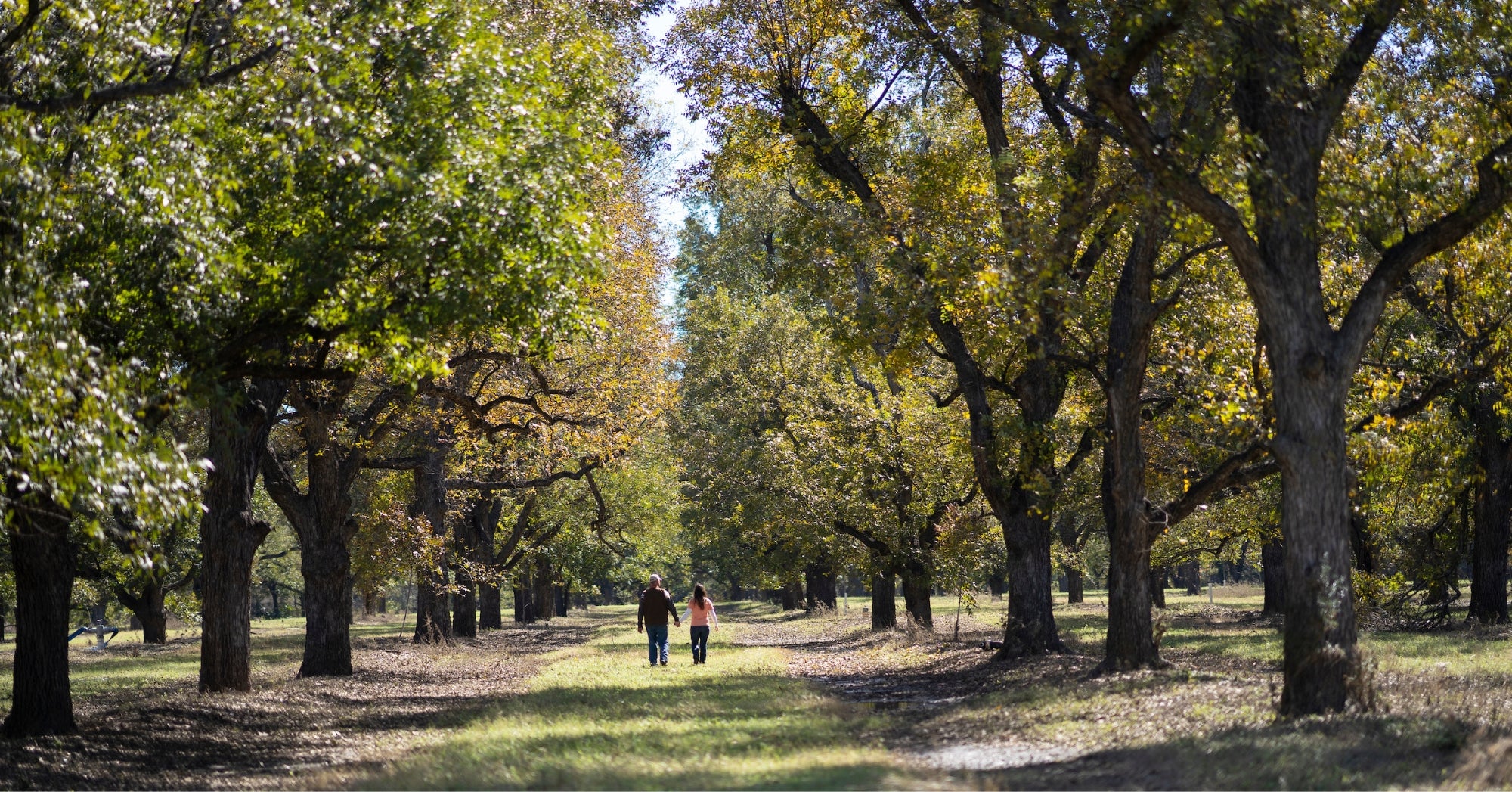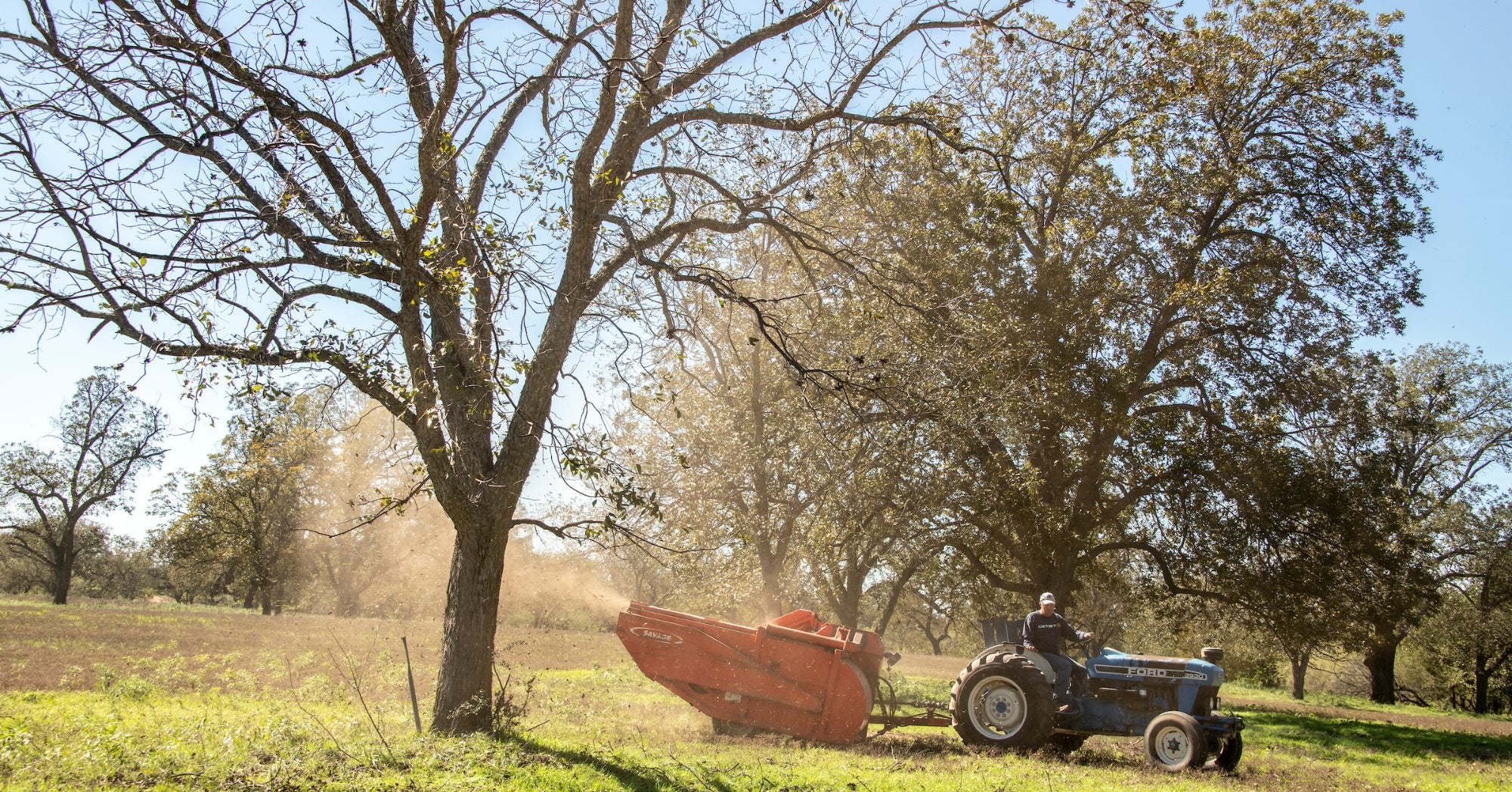Winston and Kristen Millican, owners of Millican Pecans in Texas, are part of a legacy that stretches back over a century, to when Winston’s great-great-grandfather planted the first pecan trees in San Saba in the late 1800s. His fascination with cross-pollination and grafting led to innovative techniques that laid the foundation for the family’s pecan farming business.
The early days of pecan farming were experimental, with the farm’s founder attempting to grow identical pecan trees from nuts that he considered superior. He soon discovered, however, that pecans don’t grow true to type, meaning each tree from the same cluster could produce entirely different varieties.
This realization propelled him into more advanced grafting methods and an enduring interest in pecan cultivation that would shape the family’s future in agriculture. The techniques he developed are still being used, remarkably unchanged, even by the U.S. Department of Agriculture, which continues to apply the basic principles of pollination control he pioneered.
As the fifth generation of Millicans to farm pecans, Winston and Kristen have continued this legacy, but the road hasn’t always been easy. While San Saba is often referred to as the Pecan Capital of the World, growing pecans in Central Texas comes with unique challenges — chief among them is water scarcity. Winston noted that pecans require substantial amounts of water, but droughts in recent years have forced them to rely on purchasing pecans from other growers to meet their production demands.
This shift has led to the development of strong relationships with other farmers who share the Millicans’ commitment to quality, ensuring they can continue to produce high-grade pecans and related products.

“We’ve had to buckle down and find ways to adapt,” Winston explained. But despite long bouts of drought, Winston remains optimistic. Recent rains have brought some relief, and this year’s crop is expected to be more substantial than in years past.
Beyond water scarcity, one of the Millicans’ biggest challenges as crop producers has been marketing pecans in a modern, highly competitive landscape. Historically, pecans were seen primarily as a baking ingredient, relegated to seasonal use in pies and desserts, especially in the South.
But in recent years, thanks to efforts from organizations such as the American Pecan Promotion Board, the narrative around pecans has shifted. The APPB is a checkoff program that has made significant strides in rebranding pecans as not only a staple of Southern sweets but also a healthy, versatile snack that can compete with other popular nuts like almonds, walnuts, and pistachios.
“Pecans are chocked with different vitamins and minerals and healthy fats and antioxidants that have all these health benefits, yet it has been kind of relegated to the baking aisle,” said Anne Warden, chief executive officer of the APPB and American Pecan Council.
Unlike most checkoffs, which of long histories supporting their commodities, the American Pecan Promotion Board was created recently, in 2021. The APPB’s mission is twofold: to elevate the perception of pecans in consumers’ minds and to drive demand for pecans by promoting their versatility and nutritional benefits.
The mission of the American Pecan Council differs from that of APPB, though it is complementary. Based in Fort Worth, Texas, the council represents pecan growers, harvesters, and processors. Founded in 2016 through a federal marketing order, it aims to promote the benefits of pecans. The organization is funded by pecan handlers in 15 pecan-producing states: Alabama, Arkansas, Arizona, California, Florida, Georgia, Kansas, Louisiana, Missouri, Mississippi, North Carolina, New Mexico, Oklahoma, South Carolina, and Texas.
Meanwhile, the newer APPB, formed in 2021 under USDA oversight, is an industry research and promotion program comprised of pecan producers and importers dedicated to promoting the benefits of pecans, growing its position in the marketplace and developing new uses for pecans.
“By coming together through checkoffs, they’re able to have one unified voice that they can reach directly to the consumers, but also the buyers who are purchasing their product,” Warden said.
Pecans are packed with antioxidants, healthy fats, and fiber, making them a heart-healthy, protein-rich option for snacking and everyday meals. Yet, many pecan producers believe that consumers are often unaware of these benefits, which is something the APPB and the Millicans are actively working to change.
“Pecans are the only native nut to the United States,” Kristen said. “That’s a huge point of pride, and we want consumers to know that when they choose pecans, they’re choosing something that’s not just local, but also incredibly healthy.”
APPB campaigns like “Surprisingly Snackable Pecans” are designed to bring pecans out of the baking aisle and into the hands of a new generation of consumers looking for healthy snack options. This campaign emphasizes how pecans can be easily integrated into savory dishes, salads, or eaten alone as a snack, helping to shift consumer perceptions and broaden pecans’ appeal beyond their traditional uses.
“Pecans have the highest amount of antioxidants of other nuts. They have high amounts of fiber,” says Warden. “They have those healthy fats. And those healthy fats we know are good for heart health and management of other chronic illnesses.”
Despite these marketing pushes, breaking through the crowded marketplace of snack foods is difficult. Pecans are more expensive to produce than other nuts, a factor reflected in their retail prices, which can make them less accessible to some consumers.
The rising costs of farming due to drought and other factors have only added to the pressure, with pecan farmers seeing their margins shrink as their production costs continue to climb. However, both Winston and Kristen remain hopeful that, as more consumers become aware of the health benefits and versatility of pecans, demand will increase and prices will stabilize.
Another struggle is that international trade, particularly with China, has dramatically shifted the pecan market.
“Before the trade wars, China was buying huge amounts of pecans, and growers were getting $3 a pound,” Winston said. “When the tariffs hit, that market evaporated overnight, and we had to figure out what to do with all those pecans.”
While their crop volume isn’t as large as other nuts like almonds and walnuts, which face similar challenges, the sudden loss of a significant export market was a major blow to the industry.
Amid all of this, the Millicans said they have embraced resilience and diversification. By expanding their product line beyond raw pecans to include candies and gift baskets, they’ve built a successful online business that reaches consumers across the country. Their operation has grown from its humble beginnings, with the couple creating their first website as college students in 2002, to a robust business that continues to thrive today.
The Millicans say that family remains at the heart of everything they do. Their children are growing up surrounded by the orchards, and Winston and Kristen hope to pass the family business onto them.
“We want to keep this legacy alive,” Kristen said. “It’s not just about farming; it’s about family, tradition, and leaving something behind that will last for generations.”
That legacy extends to the land itself. The Millicans take pride in their stewardship of the environment, adhering to sustainable farming practices to ensure that their orchards will continue to produce for generations to come. They don’t plow their orchards, opting instead to let native grasses grow and provide natural soil cover. They also practice a mix of irrigation techniques, from drip irrigation to micro-sprinklers, depending on the orchard’s needs, always balancing water conservation with crop productivity.

The Millicans look forward to the role pecans can play in both the food industry and in promoting sustainable, responsible agriculture. They believe that as awareness grows about pecans’ health benefits and rich American history, more consumers will choose pecans not just for the holidays, but year-round.
With deep roots in the industry and a commitment to innovation and sustainability, Winston and Kristen Millican are carrying their family’s legacy forward, one pecan at a time.

Heidi Crnkovic, is the Associate Editor for AGDAILY. She is a New Mexico native with deep-seated roots in the Southwest and a passion for all things agriculture.



